In the rich tapestry of Celtic mythology, a pantheon of deities stands testament to the ancient Celts’ deep connection with nature, heroism, and the mystical. Among these revered figures is Oghma, an emblematic deity known for his eloquence and intellectual prowess. As a pivotal figure in Celtic lore, Oghma is not just a god; he is the personification of knowledge and communication, often depicted as a champion of words and thoughts. His significance in Celtic mythology extends beyond mere storytelling, embodying the cultural and spiritual ethos of the Celtic people. This article delves into the enigmatic world of Oghma, unraveling his myths, symbols, and enduring influence, offering a comprehensive understanding of his role in Celtic mythology and its lasting impact on cultural heritage.
| Attribute | Oghma Information |
|---|---|
| Origin | Irish Mythology |
| Deity Type | God of Eloquence, Knowledge, and Writing |
| Role | God associated with eloquence, speech, poetry, and sacred knowledge |
| Ogham Script | Credited with inventing the Ogham script, an ancient Irish writing system |
| Learning | Revered as a patron of learning, scholars, and the dissemination of knowledge |
| Cultural Impact | A central figure in Irish mythology, symbolizing wisdom and communication |
| Depictions | Featured in Irish folklore and myths, often with references to writing and knowledge |
1. Historical Context of Oghma
The Celtic Pantheon
The Celts, known for their profound spiritual connection with nature and the divine, nurtured a rich mythology, replete with gods and goddesses embodying natural forces and human virtues. This pantheon reflects their beliefs and values, deeply intertwined with their daily lives and cosmic understanding. The Celtic deities, often linked to specific aspects of life and nature, were not just worshipped but also deeply respected as integral parts of the community’s spiritual fabric.
Oghma: The Origin and Evolution in Celtic Lore
Oghma, a distinguished deity in this pantheon, emerges as a figure of eloquence and wisdom. His origins, rooted in ancient Celtic mythology, portray him as a god of speech, writing, and perhaps most notably, the inventor of the Ogham script, an early form of alphabet used in Celtic inscriptions. This association with language and communication marks Oghma as a vital conduit between the divine and the mundane, a bridge of understanding and enlightenment.
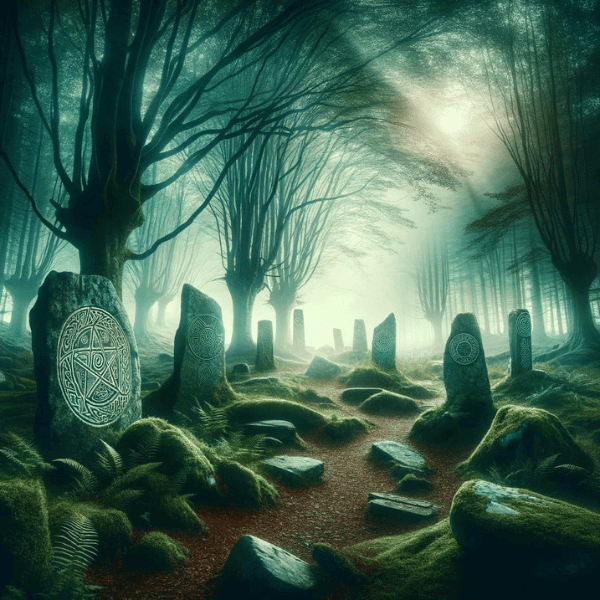
Comparative Mythology: Oghma and Hermes
A compelling aspect of studying Oghma involves drawing parallels with deities from other mythologies. For instance, Hermes of Greek mythology shares several attributes with Oghma. Both gods are messengers: Hermes serves as the divine herald in Greek myths, while Oghma plays a similar role in Celtic stories. They embody intellect, travel, and the transition of knowledge, highlighting a common thread in ancient cultures – the reverence for gods who facilitate communication and understanding. This comparative analysis not only enriches our comprehension of Oghma but also underscores the universal themes prevalent across various mythological traditions.
2. Mythological Tales and Legends
The Chronicles of Oghma: Key Myths Unfolded
Oghma’s mythological narrative is rich with tales that highlight his prowess and significance. One prominent myth describes his invention of the Ogham script, a feat that underscores his role as a patron of knowledge and language. According to legend, Oghma created this script to bridge the human and the divine, providing a sacred tool for communication. Another tale recounts Oghma’s feats of strength and intellect, often pitting him against formidable foes, only to emerge victorious through a blend of physical might and cunning wit.
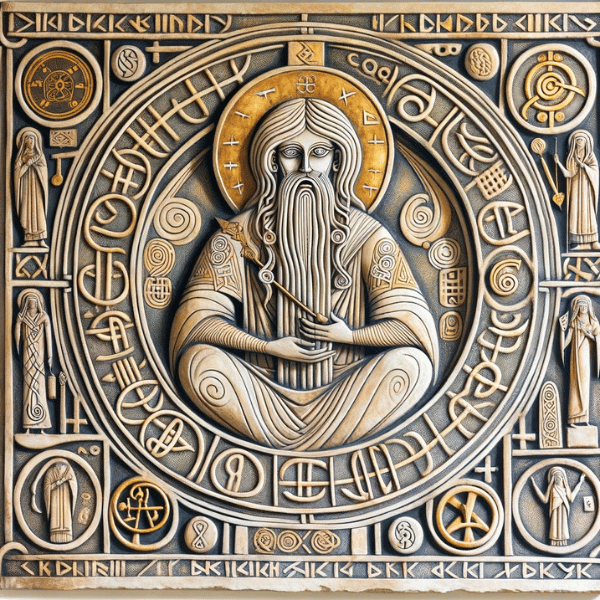
Divine Kinship: Oghma and the Celtic Deities
In the intricate web of Celtic mythology, Oghma’s interactions with other deities paint a picture of his role within the pantheon. His relationship with Lugh, a master of skills, and Dagda, the good god, is particularly noteworthy. These interactions often display a blend of rivalry and camaraderie, reflecting the dynamic and interconnected nature of the Celtic gods. Oghma’s presence in these tales serves as a crucial link, weaving together various strands of myth and legend.
Symbolism and Moral Underpinnings in Oghma’s Tales
The stories of Oghma are rife with symbolism and moral lessons. His association with the Ogham script symbolizes the power of knowledge and the importance of communication. In tales where Oghma triumphs over adversity, there’s a recurring theme of intellect over brute force, emphasizing the Celtic reverence for wisdom and eloquence. These stories offer more than entertainment; they serve as moral compasses, guiding the ancient Celts in their values and principles. Through Oghma’s tales, we glean insights into the Celtic worldview, one where harmony with nature, respect for knowledge, and the power of words are paramount.
3. Oghma’s Symbolism and Attributes
The Emblem of Oghma: The Ogham Script
Central to Oghma’s symbolism is the Ogham script, a distinctive form of writing pivotal in ancient Celtic culture. This script, traditionally carved on stones or wood, is not just a method of communication; it is a testament to Oghma’s influence as the deity of eloquence and knowledge. Each stroke and symbol in Ogham script carries profound meanings, often connected to nature, such as trees and natural elements, reflecting the Celts’ deep reverence for the natural world. Oghma’s association with this script cements his role as the custodian of knowledge and the bridge between the mystical and the material realms.
Attributes of the God of Eloquence and Knowledge
Oghma’s attributes extend beyond his connection to the Ogham script. He is often depicted as a robust and articulate figure, embodying both physical strength and intellectual might. This dual aspect highlights the Celtic ideal of a balanced character, where brawn and brain harmoniously coexist. As the god of eloquence, Oghma is revered for his persuasive speech and profound wisdom, qualities that were highly esteemed in Celtic society. His role as a mediator and communicator among the gods and between the divine and the mortal realms further emphasizes his importance in maintaining balance and harmony within the Celtic cosmology. Through these attributes, Oghma exemplifies the power of words and knowledge, serving as an enduring symbol of wisdom and eloquence in Celtic mythology.
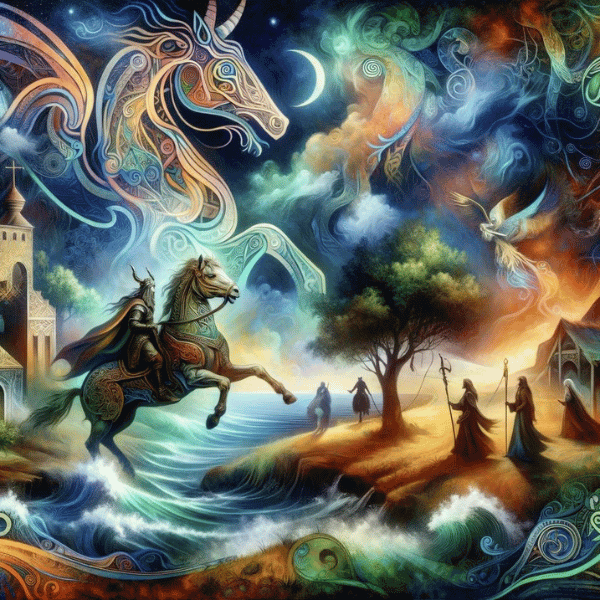
4. Artistic and Cultural Representations
Oghma in Art and Literature
The depiction of Oghma in Celtic art and literature is as varied as it is profound. Ancient Celtic artworks often portray Oghma as a muscular, powerful figure, sometimes adorned with symbols of eloquence like the Ogham script or a gold tongue, symbolizing his speech mastery. Medieval manuscripts, crucial in preserving Celtic mythology, richly detail his character. They often describe him as a warrior-poet, blending his roles as a symbol of strength and intellect. These portrayals reflect not only the Celts’ artistic expression but also their cultural values that esteemed physical prowess and intellectual capacity equally.
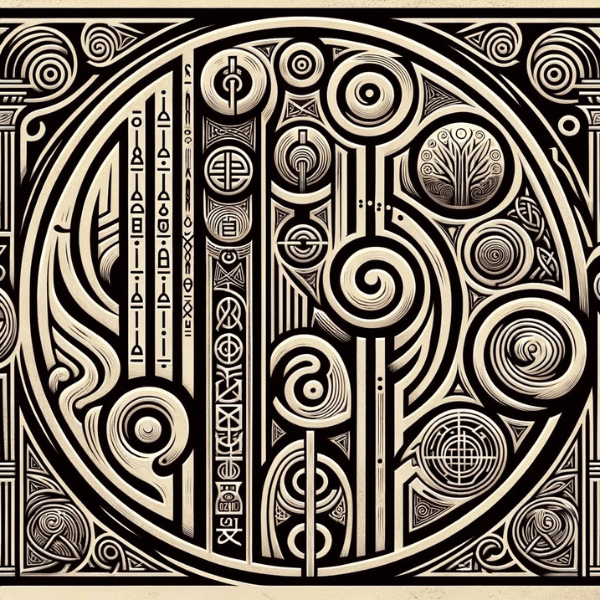
Archaeological Insights into Oghma’s Legacy
Archaeological findings have provided valuable insights into the worship and representation of Oghma. From inscriptions in the Ogham script found on ancient stones across Ireland and parts of Britain to artifacts that bear symbols associated with him, these discoveries offer tangible evidence of Oghma’s significance in the Celtic world. Notably, some of these findings suggest the existence of a cult or a dedicated following, indicating that Oghma’s influence extended beyond mythological tales into the realm of religious practice. These archaeological remnants, while scarce, are crucial in piecing together the historical veneration of Oghma and understanding how his attributes were celebrated and revered in ancient Celtic society.
5. Oghma’s Influence on Modern Culture
Oghma in Contemporary Media and Literature
The legacy of Oghma continues to resonate in modern times, finding expression in various facets of contemporary culture. In literature, Oghma often emerges as an archetype of wisdom and eloquence, inspiring characters in fantasy novels and storytelling. His influence is also evident in media, particularly in genres that explore mythological themes, where his character is sometimes reimagined or referenced. Beyond explicit mentions, the essence of Oghma’s attributes – wisdom, communication, and the power of knowledge – permeates much of today’s creative writing and media, echoing the enduring impact of his mythological persona.
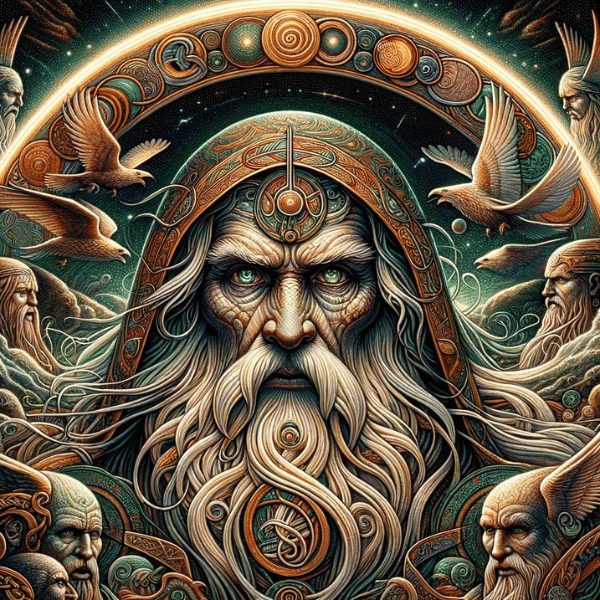
The Relevance of Oghma in Modern Spiritual Practices
In modern spiritual practices, especially those that draw from or revere ancient Celtic traditions, Oghma holds a place of honor. He is often invoked in rituals and ceremonies that emphasize wisdom, learning, and communication. Practitioners of neo-paganism and modern druidry, for instance, may call upon Oghma for guidance in intellectual pursuits or for aid in enhancing communication skills. His symbolism, particularly the Ogham script, is also used in various contemporary spiritual practices, serving as a tool for divination and self-reflection. The continued relevance of Oghma in these practices highlights the timeless nature of his attributes and the enduring appeal of Celtic mythology in seeking connection with the spiritual aspects of knowledge and eloquence.
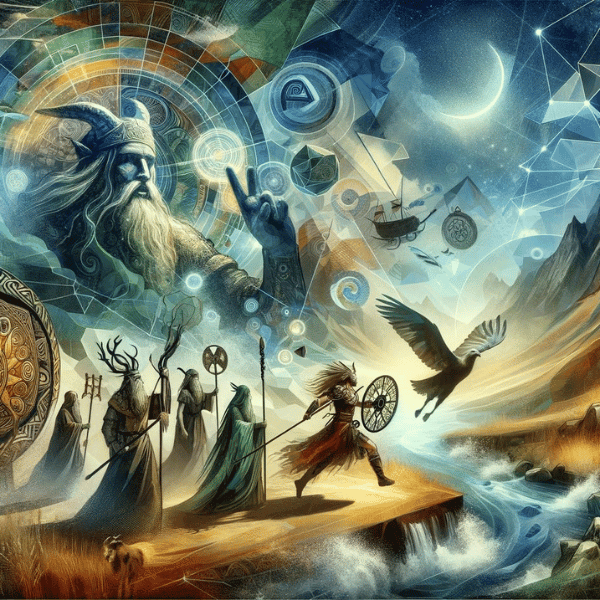
6. Conclusion
In exploring the enigmatic figure of Oghma, we uncover a multifaceted deity who embodies the Celtic reverence for eloquence, wisdom, and the power of the written word. Through his myths, symbols, and enduring cultural presence, Oghma represents more than a mythical figure; he is a symbol of the intellectual and spiritual aspirations of the ancient Celts. His influence in art, literature, and modern spiritual practices illustrates the timeless relevance of such mythological characters. Understanding Oghma and his role in Celtic mythology offers us a window into the rich tapestry of Celtic cultural heritage, reminding us of the enduring power of myth and legend in shaping our understanding of history, culture, and the human experience.
